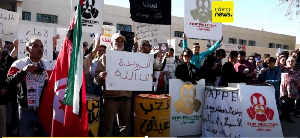Ho, June 12, GNA - Ms Marian Kpahkpah, Acting Executive Director of the National Population Council, (NPC) on Saturday, requested the support of Parliament in repositioning family planning in national development affairs. She said this had become important because of the considerable impact family planning had on population growth, socio-economic development and the well-being of both mothers and children.
Ms Kpahkpah was speaking at an advocacy seminar on Population and Development, in Ho, for the Parliamentary Caucus on Population and Development.
She said the rapid population growth and the relegation of family planning issues if not addressed adequately and urgently would bring a number of detrimental effects on national development and the quality of life.
"If our population continues to grow at the current rate in 10 years, by 2020, Ghana will have to increase its entire infrastructure for access to health, food production, education, housing and other services to maintain the quality of services we are enjoying today-not to talk of improvement," Ms Kpahkpah said.
She said family planning contribute greatly to reducing the unacceptable high rates of maternal mortality and underscored the need for Parliament to support the NPC to re-position family planning for the nation's rapid socio-economic development. Ms Kpahkpah said family planning for instance could reduce maternal mortality by making pregnancy and delivery safer and reducing the number of unintended and unwanted pregnancies. She said, "increased contraceptive use can significantly reduce the cost incurred in achieving some selected Millennium Development Goals, (MDGs) noting that Contraceptive Prevalence Rate (CPR) declined from 19 per cent in 2003 to 17 per cent in 2008.
Ms Kpahkpah stated that Ghana became the 24th member country of Partners in Population and Development, aimed at promoting South-South Cooperation in Population and Development and Reproductive Health, and called on Parliament to support the NPC in its work with other countries in the sub-region. Mr Jude Edochie, United Nations Population Fund, (UNFPA) Representative in the Country, said the UNFPA remained committed to promoting the rights of every woman, man and child to enjoy a life of health and equal opportunity.
"UNFPA will continue to support countries in the use of population data to develop evidence-based policies and programmes aimed at reducing poverty and ensuring that every pregnancy is wanted, every birth is safe, every young person is free of HIV and AIDS, and every girl and woman is treated with dignity and respect," he added. He commended the government for passing a range of relevant Human Rights-based legislations and encouraged the enforcement of those legislations.
Colonel Cyril Necku, (Rtd) Deputy Volta Regional Minister, said the current national population growth rate of 2.7 per cent posed a serious challenge to achieving accelerated socio-economic growth by 2015. He, therefore, underscored the need for a policy to control population growth in the country.
Mr Abdul Rashid Pelpuo, Chairman of Parliamentary Caucus on Population and Development, said population issues were dear to government due to their linkage with development. He said Parliament was aware of inadequate social amenities across the country due to the increasing population and assured that a policy would soon be formulated to promote the quality of life of the populace.
General News of Saturday, 12 June 2010
Source: GNA












